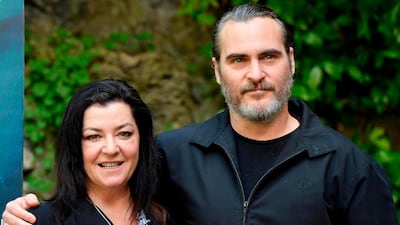Joaquin Phoenix can still remember the first time he spoke to Lynne Ramsay. The acclaimed Scottish director behind Ratcatcher and We Need to Talk About Kevin was courting Phoenix for the lead role in her latest movie, You Were Never Really Here. Trouble is, her thick Scottish accent was getting in the way. "When I first spoke to her on the phone, I had to call Jim [Wilson], the producer, and say, 'I don't really know what she said!'" he laughs. "Some stuff I got, some I didn't!"
Fortunately, there was no miscommunication once they got to set. "We're similar... there's a lot of emotion in what we say," says Phoenix, the three-time Oscar nominee famed for his intense performances in films such as The Master and Walk The Line. Just as actor and director are simpatico, they're also both perfectly tailored to the material, the 2013 short story by Jonathan Ames about a damaged war veteran-turned-urban vigilante.
For the Glasgow-born Ramsay, it was the chance to turn her hand to a style of film she'd not tackled before. "I fancied doing a pure genre piece," she says. "I was brought up on All About Eve, The Postman Always Rings Twice and Mildred Pierce. My mum loves all those B movies [with] really strong female characters." Her pared-back, elliptical script would ultimately win her Best Screenplay at the Cannes Film Festival, where the film was unveiled. Likewise, Phoenix took Best Actor for his performance.
Read more: Film review: You Were Never Really Here is a brutal masterpiece
Set in New York, the story sees Phoenix’s character Joe hired by a senator to find his daughter Nina (Ekaterina Samsonov) kidnapped and enslaved in a Manhattan brothel. But after his rescue mission goes disastrously wrong, the fallout is swift and violent. “Really it’s the anti-James Bond,” says Phoenix. “[We] wanted it to look very different and feel different than any of those movies. We got rid of all those things that you typically associate with a genre movie, and tried to create something different.”
The film studiously avoids the typical male white saviour fantasy. “We liked the idea of playing with this, in which the guy doesn’t really save the girl, and it’s really ultimately up to her to save herself,” the actor adds. “What was interesting, and something we uncovered, was this idea that we see in films…men trying to cope with their feelings of guilt or regret or failure, and the impotence of this testosterone-fuelled masculinity.”
Certainly Ramsay's film steers clear of the typical gung-ho vigilante movie. It's a genre that typically generates controversy. Take Eli Roth's recent remake of Death Wish with Bruce Willis as a surgeon who avenges the murder of his wife, which was seen as an ill-advised tale made at a time when America is questioning issues of gun control. Thankfully, Ramsay's film has more in common with Martin Scorsese's classic portrait of urban alienation, Taxi Driver.
Aided by Radiohead star Jonny Greenwood’s unsettling score, Ramsay was chiefly interested in creating a psychological portrait of the disturbed Joe. “I think it’s about this guy questioning his masculinity,” she says. “It’s the death of violence in a way.” With flashbacks to his troubled childhood and time in Afghanistan, he’s “got a history” says Ramsay, something that’s hinted at by the scar tissue all over his body. “He has a lot of issues, as it says in the book.”
While Joe is prone to using a hammer to club his opponents with, Ramsay was cautious about showing too much violence. "I don't really watch or like violent movies!" she says. "I know it sounds funny, but I try to keep it at a distance. You see the aftermath. You don't see the actual thing. Sometimes because it's the power of the imagination, it can make it feel more violent. A lot of people glamourise violence as well: 'Oh look, it's so cool.' I wasn't trying to do that."
________________
Read more:
Flash spectrum: Ezra Miller talks about everything but the big movie
We Need to Talk About Kevin: One film's exploration of a mother's agony
________________
To inhabit Joe, a former FBI agent and Gulf War vet, Phoenix bulked up furiously in the gym with a personal trainer. “It’s kind of fun at first,” he says. “I like doing anything that’s something you don’t do. And then it’s weird. It starts to change you…the physical affects the emotional or the mental. You feel differently about yourself. It’s interesting to feel your body in that way. I think that was the biggest I’d been for a while.”
Shot in New York over 29 sweltering summer days in 2016, Ramsay was amazed by Phoenix’s dedication. “He came eight weeks in advance…I’ve had actors come early to prep, but never that early.” Phoenix pays the tribute back. “We both were relentless,” he says, recalling countless hours pouring over the script and e-mail exchanges at 2am. “[We] were all tirelessly trying to find a different way to tell a story.” The revenge drama may never be the same again.
You Were Never Really Here opens in cinemas on May 10


